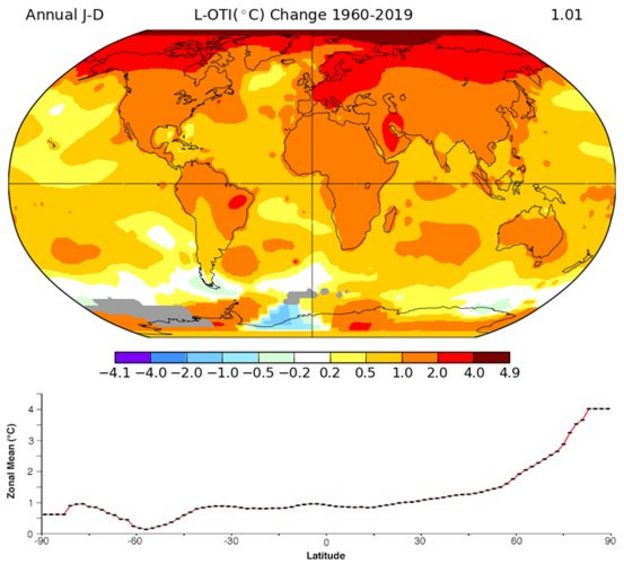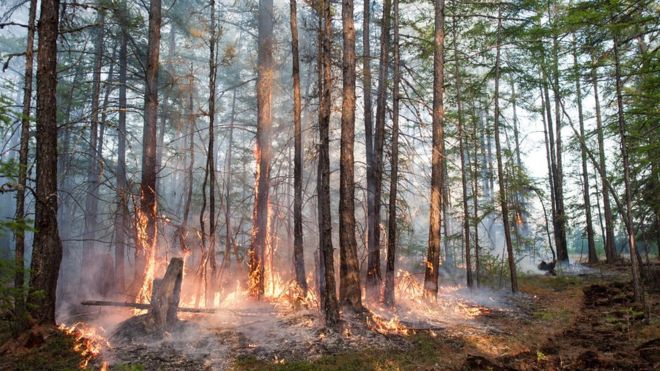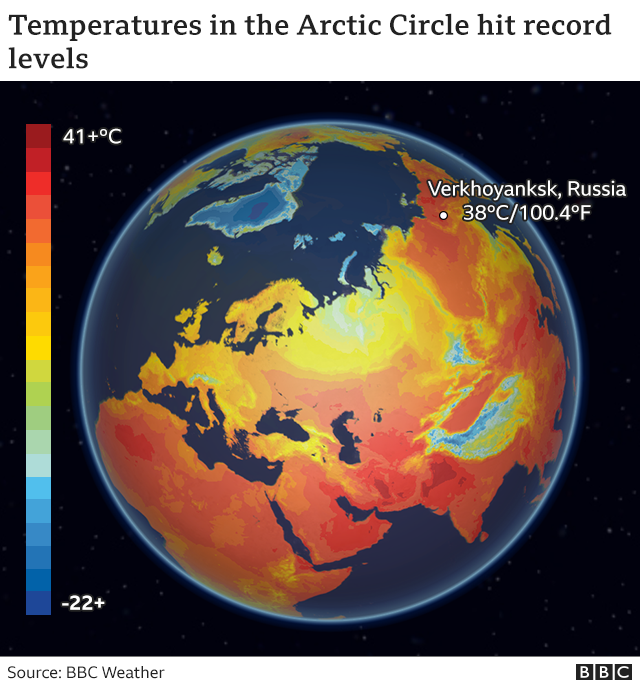Arctic Circle Sees 'Hottest-Ever' Recorded Temperatures

The
record still needs to be verified, but it appears to have been 18C higher than
the average maximum daily temperature in June.
Hot
summer weather is not uncommon in the Arctic Circle, but recent months have
seen abnormally high temperatures.
The
Arctic is believed to be warming twice as fast as the global average.
Verkhoyansk,
home to about 1,300 people, sits just inside the Arctic Circle, in remote
Siberia. It has an extreme climate with temperatures plunging in January to an
average maximum of -42C and then surging in June to 20C.
But
a persistent heatwave this year in the Arctic Circle has worried
meteorologists. In March, April and May, the Copernicus Climate Change service
reported that the average temperature was around 10C above normal.
Earlier in June,
parts of Siberia recorded 30C, while in May, Khatanga in Russia - situated in
the Arctic Circle at 72 degrees north - set a new May temperature record of
25.4C.
"Year-on-year
temperature records are being broken around the world, but the Arctic is
warming faster than anywhere else on Earth," said Dr Dann Mitchell,
associate professor in atmospheric science at the University of Bristol.
"So it is unsurprising to see records being broken in this region. We will
see more of this in the near future."
Heatwaves in the
Arctic aren't unusual. Weather patterns around the world can align in such a
way that hot air is transported quite far northward and colder air from the
poles southward.

Over the last few
months a large area of high pressure in eastern Russia has been dominant. This
has led to southerly winds bringing warmer air from near the tropics, leading
to higher than average temperatures.
However,
the persistence of this weather pattern has led to a longevity and scale of
heat that is worrying. This is consistent with what climatologists believe will
happen in the Arctic with climate change.
Most
scientists agree that over the past 30 years, the Arctic has warmed at a rate
of twice the global average.
The
graphic below shows that across the globe, through the period 1960-2019,
average air temperature has generally increased by around 1C.
However,
as you head closer to the North Pole - latitude 90° - the reds become darker.
This shows how the temperature has increased here more than anywhere else - by
around 4C.
This
is alarming scientists because as permafrost thaws, carbon dioxide and methane
previously locked up below ground is released.
These
greenhouse gases can cause further warming, and further thawing of the
permafrost, in a vicious cycle known as positive feedback.

The warmer
temperatures also cause Arctic ice to melt at a faster rate, causing sea levels
to rise.
There is also an
element of positive feedback here, says BBC Weather, because the loss of highly
reflective white ice means that the ground and sea absorb more heat. This leads
to more warming.
The
impact of wildfires are also a consideration. Last summer, they ravaged parts
of the Arctic. Although they are common in summer, high temperatures and strong
winds made them unusually severe.
They typically start
in early May before peaking in July and August but by late April this year they
were already ten times bigger in the Krasnoyarsk region of Siberia compared to
the same time last year, Russia's emergencies minister said.
Well, 2020 is certainly
shaping up to be a contender.
The
Met Office, the UK's national weather service, reckons there's a 50:50 chance
it'll be the hottest year ever recorded.
Much
of northern Europe and Asia has had an exceptionally mild spring and early
summer with temperatures 10C higher than normal in some areas.
The
hottest year to date is 2016. It is still a nose ahead, but the margins are
"very close".
Of
course, this should come as no surprise.
"We've
upset the energy balance of the entire planet," cautions Prof Chris Rapley
of University College London. Year after year we see temperature records being
broken, the eminent climate scientist says.
"This
is a warning message from the Earth itself," he tells me. "We ignore
it at our peril."
FROM .bbc.com/news/science-environment

No comments